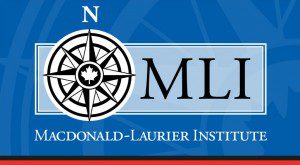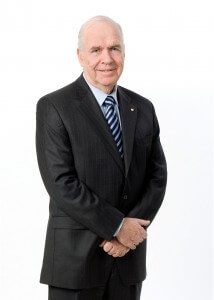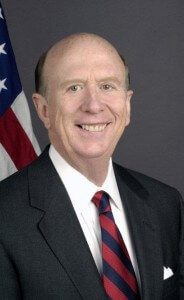 MLI brings together former ambassadors to the United States and Canada to discuss the secrets to a successful bilateral relationship
MLI brings together former ambassadors to the United States and Canada to discuss the secrets to a successful bilateral relationship
OTTAWA, March 9, 2016 – This week’s state dinner with Canadian Prime Minister Justin Trudeau and United States President Barack Obama is generating all the headlines. But what does the future hold for the Canada-US relationship?
Derek Burney and David Wilkins, former ambassadors to the US and Canada respectively, share their thoughts about the challenges and opportunities for the two countries in the coming years in a new Straight Talk Q&A with MLI.

To read the full Straight Talk Q&A, click here.
The two have years of top-level experience with Canada-US relations.
Burney served as Canada’s ambassador in Washington from 1989 to 1993, helping the negotiations that led to the North American Free-Trade Agreement. Wilkins was the U.S. ambassador to Canada from 2005 to 2009.
Both agree that the state dinner is “essentially symbolic” but believe it will be a key jumping off point for advancing the relationship between the United States and Canada, which continues to be its largest trading partner.
“Given the breadth and depth of our relations with the United States, top level meetings – symbolic or otherwise – can be used to advance the interests of both countries”, says Burney. Both ambassadors recalled periods where friendships between the prime minister and the president, as seems to be developing between Trudeau and Obama, have led to important achievements. Burney noted that “I am of course biased but I think that the Mulroney-Reagan, Mulroney-George H.W. Bush years from 1984 to 1993 were the high point”, and he pointed to the Canada US Free-Trade Agreement, NAFTA, the acid rain accord and Arctic cooperation agreement as bilateral achievements in a time of global change where Canada and the US were seen as leaders. “This was a time when trust and respect at the top anchored the tone as well as the substance of our relations, demonstrating clearly that proximity was more than a matter of shared geography,” said Burney.
According to Wilkins, “Important things get accomplished when relationships, especially at the top, are strong. I saw this firsthand as I watched President George W. Bush actively engage with Prime Minister Harper over the softwood lumber issue”. The two countries signed the agreement in 2006, “ending decades of litigation and disagreement”.

Burney and Wilkins engaged in a wide-ranging discussion including insights on:
- How the outcome of the US election will affect the Canada-US relationship, especially given some of the presidential candidates’ concerns about NAFTA;
- How the Canada-US relationship has changed historically;
- How to resolve several key bilateral issues, including: a new softwood lumber agreement; the Keystone XL pipeline and other energy infrastructure issues; US concerns about Canada’s free trade negotiations with China; the Trans-Pacific Partnership; climate change; the fight against ISIS; Canada’s intake of Syrian refugees; and Arctic co-operation.
- The importance of nurturing relationships with members of Congress.
***
Ambassador David Wilkins is a partner at Nelson Mullins Riley & Scarborough LLP and chairs the Public Policy and International Law practice group with a special focus on US-Canada interests. He served as US ambassador to Canada from June 2005 to January 2006, appointed by President George W. Bush.
Former ambassador Derek Burney became Chief of Staff to in the Office of the Prime Minister in 1987, where he was directly involved in the negotiation and successful conclusion of the Canada-US Free Trade Agreement. Mr. Burney served as Canada’s ambassador to the United States from 1989 to 1993.
The Macdonald-Laurier Institute is the only non-partisan, independent national public policy think tank in Ottawa focusing on the full range of issues that fall under the jurisdiction of the federal government.
For more information, please contact Mark Brownlee, communications manager, at 613-482-8327 x105 or email at mark.brownlee@macdonaldlaurier.ca.




